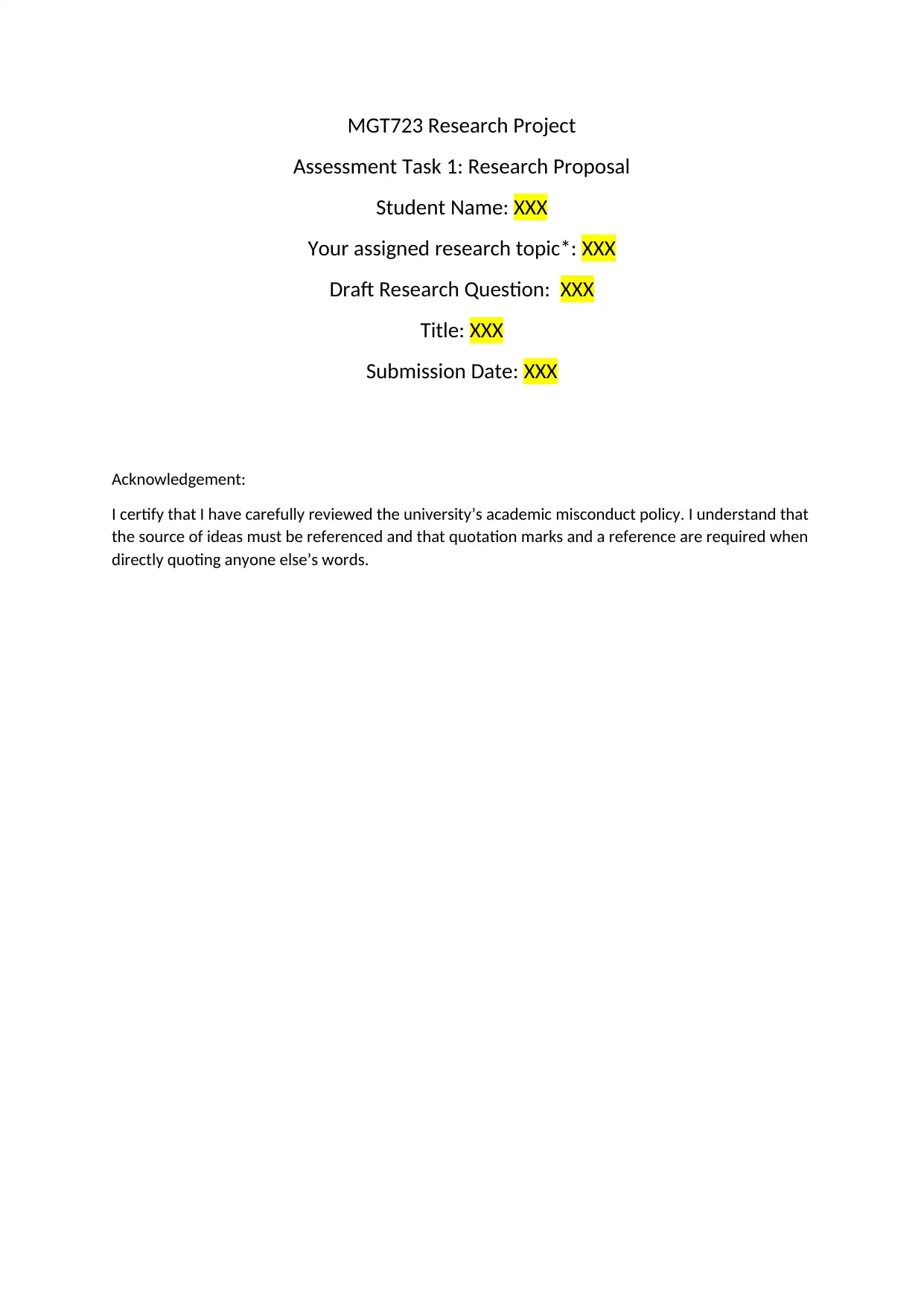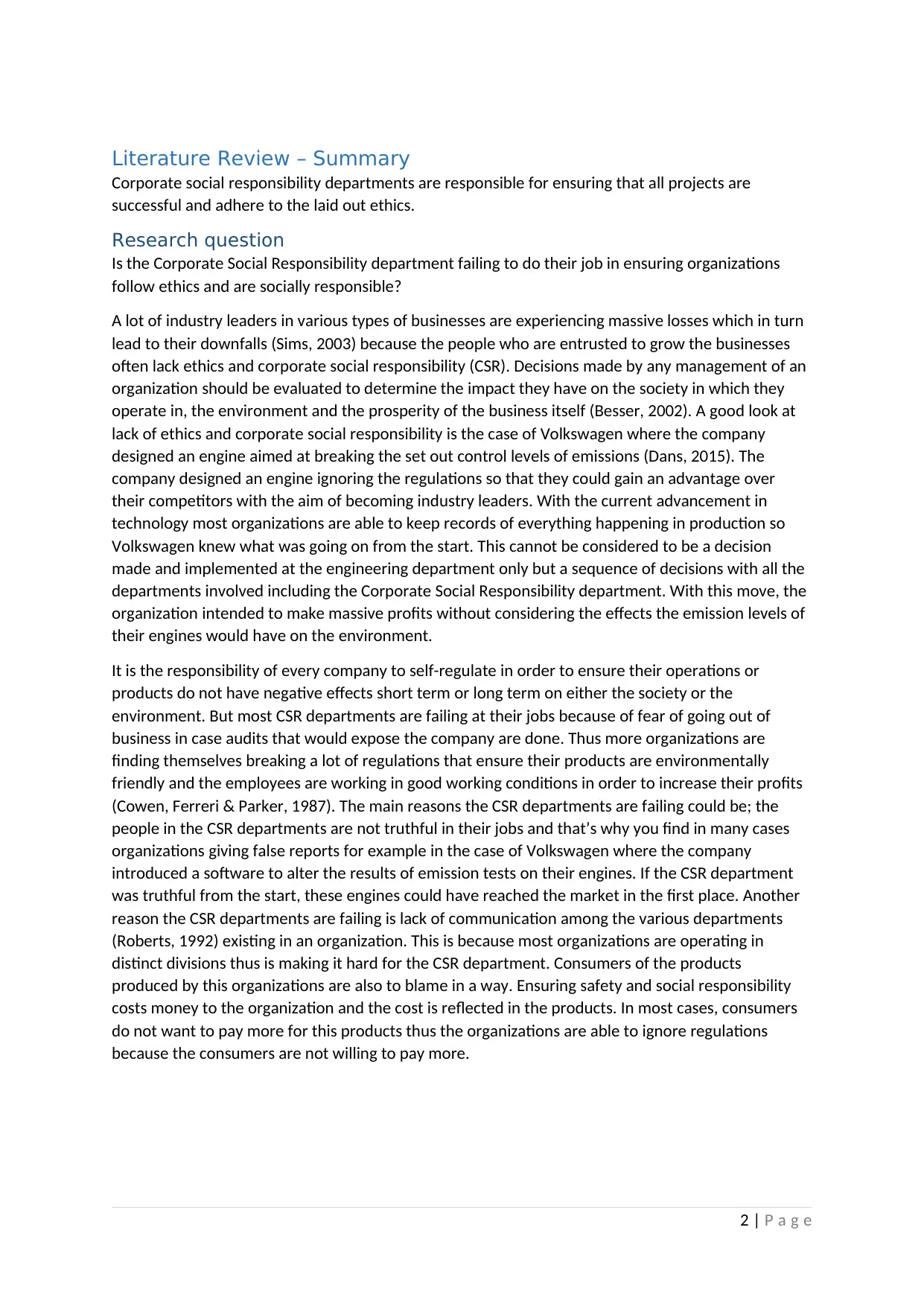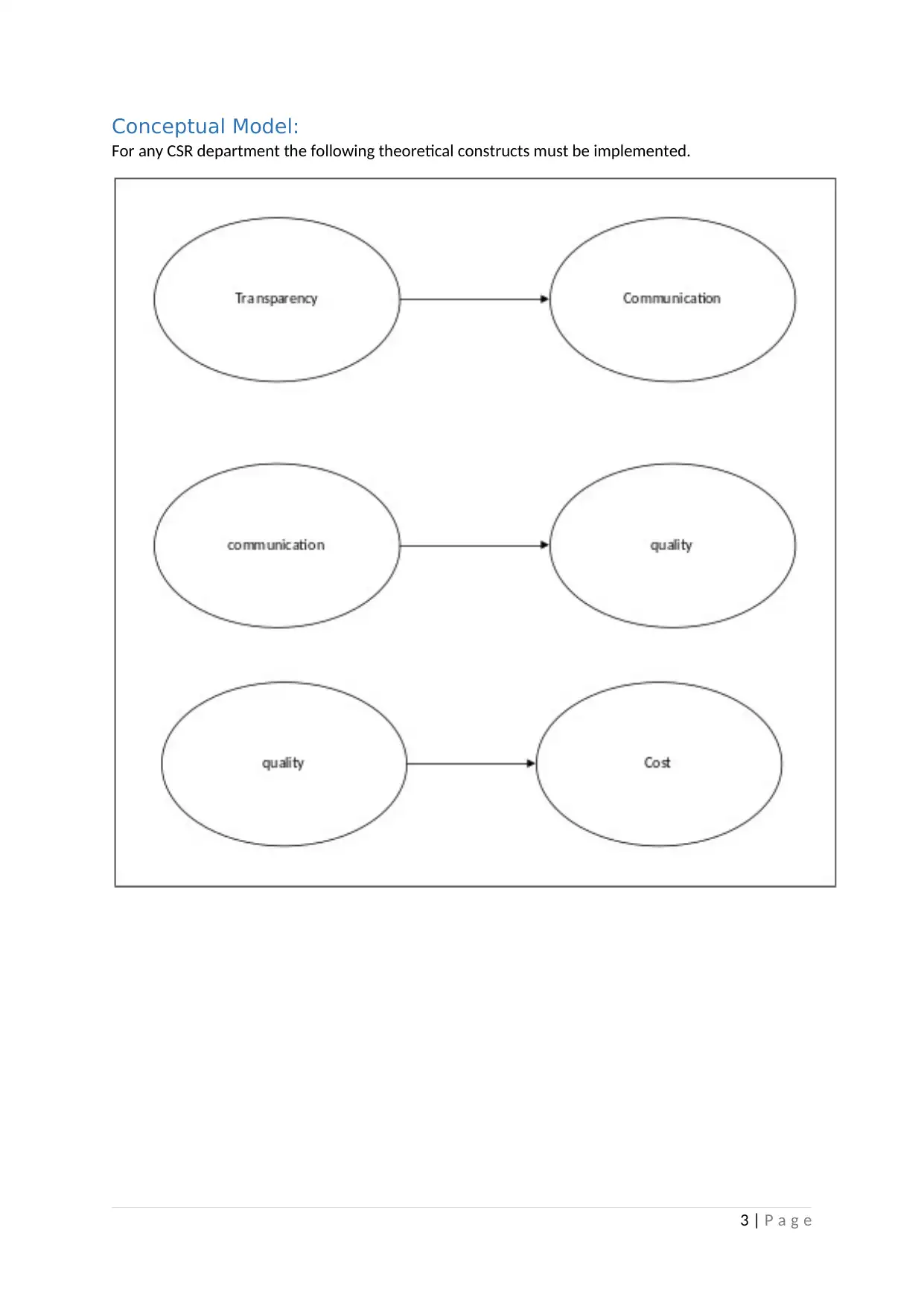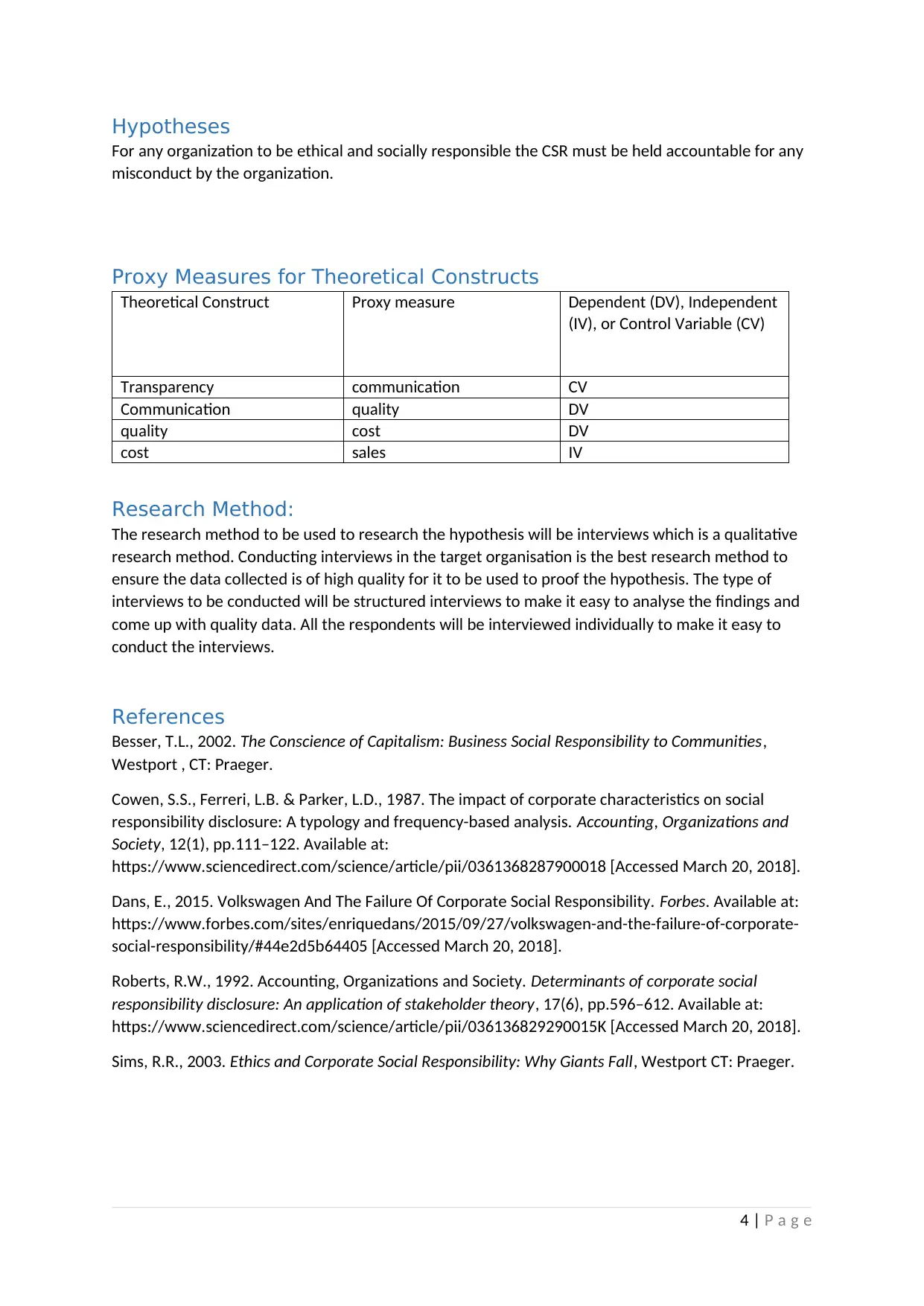MGT723 Research Project Assessment Task 1: Research Proposal
VerifiedAdded on 2021/04/21
|4
|1022
|34
Report
AI Summary
This research proposal, submitted for MGT723, investigates the failures of Corporate Social Responsibility (CSR) departments in ensuring ethical and socially responsible practices within organizations. The literature review highlights issues like lack of transparency, communication gaps, and the influence of consumer behavior, using the Volkswagen emissions scandal as a case study. The research question explores whether CSR departments are effectively fulfilling their roles in upholding organizational ethics and social responsibility. A conceptual model is proposed, outlining key theoretical constructs and hypotheses related to transparency, communication, and quality. The research methodology involves structured interviews as a qualitative approach to gather high-quality data to test the hypotheses. The proposal emphasizes the importance of CSR accountability and suggests proxy measures for evaluating the effectiveness of CSR initiatives, providing a framework for further research and analysis in the field of leadership and management.

MGT723 Research Project
Assessment Task 1: Research Proposal
Student Name: XXX
Your assigned research topic*: XXX
Draft Research Question: XXX
Title: XXX
Submission Date: XXX
Acknowledgement:
I certify that I have carefully reviewed the university’s academic misconduct policy. I understand that
the source of ideas must be referenced and that quotation marks and a reference are required when
directly quoting anyone else’s words.
Assessment Task 1: Research Proposal
Student Name: XXX
Your assigned research topic*: XXX
Draft Research Question: XXX
Title: XXX
Submission Date: XXX
Acknowledgement:
I certify that I have carefully reviewed the university’s academic misconduct policy. I understand that
the source of ideas must be referenced and that quotation marks and a reference are required when
directly quoting anyone else’s words.
Paraphrase This Document
Need a fresh take? Get an instant paraphrase of this document with our AI Paraphraser

Literature Review – Summary
Corporate social responsibility departments are responsible for ensuring that all projects are
successful and adhere to the laid out ethics.
Research question
Is the Corporate Social Responsibility department failing to do their job in ensuring organizations
follow ethics and are socially responsible?
A lot of industry leaders in various types of businesses are experiencing massive losses which in turn
lead to their downfalls (Sims, 2003) because the people who are entrusted to grow the businesses
often lack ethics and corporate social responsibility (CSR). Decisions made by any management of an
organization should be evaluated to determine the impact they have on the society in which they
operate in, the environment and the prosperity of the business itself (Besser, 2002). A good look at
lack of ethics and corporate social responsibility is the case of Volkswagen where the company
designed an engine aimed at breaking the set out control levels of emissions (Dans, 2015). The
company designed an engine ignoring the regulations so that they could gain an advantage over
their competitors with the aim of becoming industry leaders. With the current advancement in
technology most organizations are able to keep records of everything happening in production so
Volkswagen knew what was going on from the start. This cannot be considered to be a decision
made and implemented at the engineering department only but a sequence of decisions with all the
departments involved including the Corporate Social Responsibility department. With this move, the
organization intended to make massive profits without considering the effects the emission levels of
their engines would have on the environment.
It is the responsibility of every company to self-regulate in order to ensure their operations or
products do not have negative effects short term or long term on either the society or the
environment. But most CSR departments are failing at their jobs because of fear of going out of
business in case audits that would expose the company are done. Thus more organizations are
finding themselves breaking a lot of regulations that ensure their products are environmentally
friendly and the employees are working in good working conditions in order to increase their profits
(Cowen, Ferreri & Parker, 1987). The main reasons the CSR departments are failing could be; the
people in the CSR departments are not truthful in their jobs and that’s why you find in many cases
organizations giving false reports for example in the case of Volkswagen where the company
introduced a software to alter the results of emission tests on their engines. If the CSR department
was truthful from the start, these engines could have reached the market in the first place. Another
reason the CSR departments are failing is lack of communication among the various departments
(Roberts, 1992) existing in an organization. This is because most organizations are operating in
distinct divisions thus is making it hard for the CSR department. Consumers of the products
produced by this organizations are also to blame in a way. Ensuring safety and social responsibility
costs money to the organization and the cost is reflected in the products. In most cases, consumers
do not want to pay more for this products thus the organizations are able to ignore regulations
because the consumers are not willing to pay more.
2 | P a g e
Corporate social responsibility departments are responsible for ensuring that all projects are
successful and adhere to the laid out ethics.
Research question
Is the Corporate Social Responsibility department failing to do their job in ensuring organizations
follow ethics and are socially responsible?
A lot of industry leaders in various types of businesses are experiencing massive losses which in turn
lead to their downfalls (Sims, 2003) because the people who are entrusted to grow the businesses
often lack ethics and corporate social responsibility (CSR). Decisions made by any management of an
organization should be evaluated to determine the impact they have on the society in which they
operate in, the environment and the prosperity of the business itself (Besser, 2002). A good look at
lack of ethics and corporate social responsibility is the case of Volkswagen where the company
designed an engine aimed at breaking the set out control levels of emissions (Dans, 2015). The
company designed an engine ignoring the regulations so that they could gain an advantage over
their competitors with the aim of becoming industry leaders. With the current advancement in
technology most organizations are able to keep records of everything happening in production so
Volkswagen knew what was going on from the start. This cannot be considered to be a decision
made and implemented at the engineering department only but a sequence of decisions with all the
departments involved including the Corporate Social Responsibility department. With this move, the
organization intended to make massive profits without considering the effects the emission levels of
their engines would have on the environment.
It is the responsibility of every company to self-regulate in order to ensure their operations or
products do not have negative effects short term or long term on either the society or the
environment. But most CSR departments are failing at their jobs because of fear of going out of
business in case audits that would expose the company are done. Thus more organizations are
finding themselves breaking a lot of regulations that ensure their products are environmentally
friendly and the employees are working in good working conditions in order to increase their profits
(Cowen, Ferreri & Parker, 1987). The main reasons the CSR departments are failing could be; the
people in the CSR departments are not truthful in their jobs and that’s why you find in many cases
organizations giving false reports for example in the case of Volkswagen where the company
introduced a software to alter the results of emission tests on their engines. If the CSR department
was truthful from the start, these engines could have reached the market in the first place. Another
reason the CSR departments are failing is lack of communication among the various departments
(Roberts, 1992) existing in an organization. This is because most organizations are operating in
distinct divisions thus is making it hard for the CSR department. Consumers of the products
produced by this organizations are also to blame in a way. Ensuring safety and social responsibility
costs money to the organization and the cost is reflected in the products. In most cases, consumers
do not want to pay more for this products thus the organizations are able to ignore regulations
because the consumers are not willing to pay more.
2 | P a g e

Conceptual Model:
For any CSR department the following theoretical constructs must be implemented.
3 | P a g e
For any CSR department the following theoretical constructs must be implemented.
3 | P a g e
⊘ This is a preview!⊘
Do you want full access?
Subscribe today to unlock all pages.

Trusted by 1+ million students worldwide

Hypotheses
For any organization to be ethical and socially responsible the CSR must be held accountable for any
misconduct by the organization.
Proxy Measures for Theoretical Constructs
Theoretical Construct Proxy measure Dependent (DV), Independent
(IV), or Control Variable (CV)
Transparency communication CV
Communication quality DV
quality cost DV
cost sales IV
Research Method:
The research method to be used to research the hypothesis will be interviews which is a qualitative
research method. Conducting interviews in the target organisation is the best research method to
ensure the data collected is of high quality for it to be used to proof the hypothesis. The type of
interviews to be conducted will be structured interviews to make it easy to analyse the findings and
come up with quality data. All the respondents will be interviewed individually to make it easy to
conduct the interviews.
References
Besser, T.L., 2002. The Conscience of Capitalism: Business Social Responsibility to Communities,
Westport , CT: Praeger.
Cowen, S.S., Ferreri, L.B. & Parker, L.D., 1987. The impact of corporate characteristics on social
responsibility disclosure: A typology and frequency-based analysis. Accounting, Organizations and
Society, 12(1), pp.111–122. Available at:
https://www.sciencedirect.com/science/article/pii/0361368287900018 [Accessed March 20, 2018].
Dans, E., 2015. Volkswagen And The Failure Of Corporate Social Responsibility. Forbes. Available at:
https://www.forbes.com/sites/enriquedans/2015/09/27/volkswagen-and-the-failure-of-corporate-
social-responsibility/#44e2d5b64405 [Accessed March 20, 2018].
Roberts, R.W., 1992. Accounting, Organizations and Society. Determinants of corporate social
responsibility disclosure: An application of stakeholder theory, 17(6), pp.596–612. Available at:
https://www.sciencedirect.com/science/article/pii/036136829290015K [Accessed March 20, 2018].
Sims, R.R., 2003. Ethics and Corporate Social Responsibility: Why Giants Fall, Westport CT: Praeger.
4 | P a g e
For any organization to be ethical and socially responsible the CSR must be held accountable for any
misconduct by the organization.
Proxy Measures for Theoretical Constructs
Theoretical Construct Proxy measure Dependent (DV), Independent
(IV), or Control Variable (CV)
Transparency communication CV
Communication quality DV
quality cost DV
cost sales IV
Research Method:
The research method to be used to research the hypothesis will be interviews which is a qualitative
research method. Conducting interviews in the target organisation is the best research method to
ensure the data collected is of high quality for it to be used to proof the hypothesis. The type of
interviews to be conducted will be structured interviews to make it easy to analyse the findings and
come up with quality data. All the respondents will be interviewed individually to make it easy to
conduct the interviews.
References
Besser, T.L., 2002. The Conscience of Capitalism: Business Social Responsibility to Communities,
Westport , CT: Praeger.
Cowen, S.S., Ferreri, L.B. & Parker, L.D., 1987. The impact of corporate characteristics on social
responsibility disclosure: A typology and frequency-based analysis. Accounting, Organizations and
Society, 12(1), pp.111–122. Available at:
https://www.sciencedirect.com/science/article/pii/0361368287900018 [Accessed March 20, 2018].
Dans, E., 2015. Volkswagen And The Failure Of Corporate Social Responsibility. Forbes. Available at:
https://www.forbes.com/sites/enriquedans/2015/09/27/volkswagen-and-the-failure-of-corporate-
social-responsibility/#44e2d5b64405 [Accessed March 20, 2018].
Roberts, R.W., 1992. Accounting, Organizations and Society. Determinants of corporate social
responsibility disclosure: An application of stakeholder theory, 17(6), pp.596–612. Available at:
https://www.sciencedirect.com/science/article/pii/036136829290015K [Accessed March 20, 2018].
Sims, R.R., 2003. Ethics and Corporate Social Responsibility: Why Giants Fall, Westport CT: Praeger.
4 | P a g e
1 out of 4
Related Documents
Your All-in-One AI-Powered Toolkit for Academic Success.
+13062052269
info@desklib.com
Available 24*7 on WhatsApp / Email
![[object Object]](/_next/static/media/star-bottom.7253800d.svg)
Unlock your academic potential
Copyright © 2020–2026 A2Z Services. All Rights Reserved. Developed and managed by ZUCOL.




